Field Notes on Dating 💘

Wow, did I underestimate the complexity of relationships...! Easily one of the toughest problems I’ve grappled with to date (still grappling 🥲). Given the tremendous amount of time & energy navigating this rollercoaster is requiring, I rly need to organize my thoughts. What better way to force objectivity & quality than the pressure of a public post on a highly-debated subject?
Anyways - all of this is me trying to wrap my arms (figuratively & literally) around love, so give me some rope 🙏🏻
It comes down to compatibility 🧩
Personally, I find the “just go with the flow” approach highly ineffective. Couple this ambiguity with the vortex of noise in social media (there def are good ones, but also a ton that aren’t applicable for my scenario, or just horrible altogether), and it’s like trying to swim in the middle of a typhoon 😵. Don’t get me wrong, I still do go with the flow (it’s what adds the spice), but it needs to be paired with some structure & clarity.
From what I’ve gathered, the problem of love is one of compatibility. The fact that we make decisions on whether to proceed in a relationship with someone means that there is some set of criteria by which we are making these decisions (albeit highly chaotic). Though it’ll be impossible to come up with an “equation of love” (at least today, maybe ever), I believe it is important to translate what’s already going on in our heads into a framework to help us all navigate this more efficiently (e.g. reduce mis-leadings, ghosting, heartbreaks) and make the path to love less obscure. Though I initially was a tad averse to going down this path (at first felt kinda mechanical/dry), I’ve concluded that it’s actually the more compassionate and romantic route.
However, this does require considerable mental energy & perseverance (heck, even just writing this fried my brain 🤯), which is why having a framework (to lower the mental barrier to enable continuous refinement) is important. Foregoing this work is not only bad for ourselves, but can be terrible for others - let’s all be good people.
So, what’s “compatibility”?
By definition, compatibility is a “composite score” comprised of multiple criteria (e.g. physical features, humor, values, life outlook/goals), each with a “minimum score” (below which you are not willing to go for). Figuring out which of these criteria are your core (and to what extent) is the initial goal.
This is your compatibility function, not some shortsighted “market value” of a person (i.e. people have different “types”).
Essentially, this is an incredibly difficult (and non-quantifiable) risk management exercise:
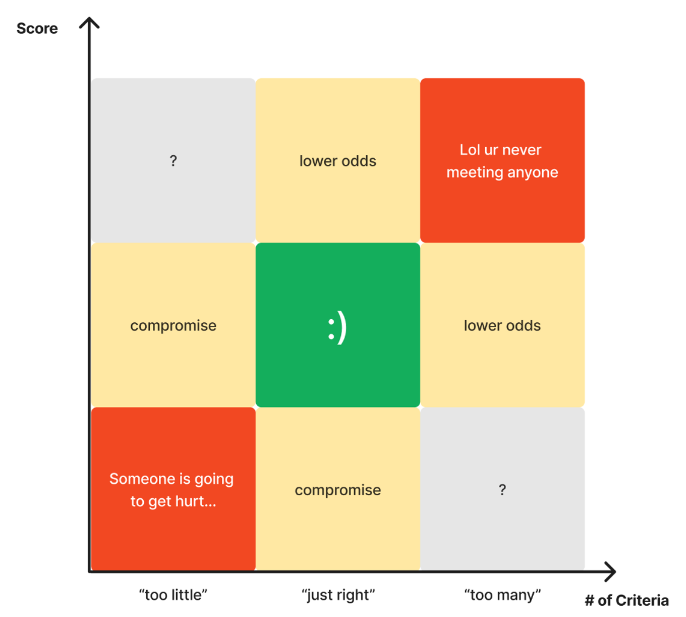
It boils down to what we know intuitively:
Upper Right 🟥: “Expectations too high”
You mindlessly tacked on every requirement you could think of, painting what you believed to be “ideal” at that point in time (which is probably false precision, btw ⚠️).
All u’r doing is reducing your chances of developing a relationship with anyone at all (this person may not exist, or even if they do - the chances of ever meeting is infinitesimally small). Despite the “unlimited options” illusion dating apps have created, meeting someone w/ strong compatibility is incredibly hard - don’t make it truly impossible.
Lower Left 🟥: “Expectations too loose”
If you slack off and don’t define this clearly (or are ill-intentioned), u can easily end up wasting the other person’s time, or worse - hurting them. 🤕
You also can burn yourself out from the sheer volume of engagements and not be emotionally present when it really matters (i.e. dates w/ high-compatibility people ⚠️).
So there is an “area of compatibility” (starting from the 🟩) which we must strive to identify. From there, which direction you expand your “range” is a highly personal decision (each side with its own tradeoffs - a subject for later post).
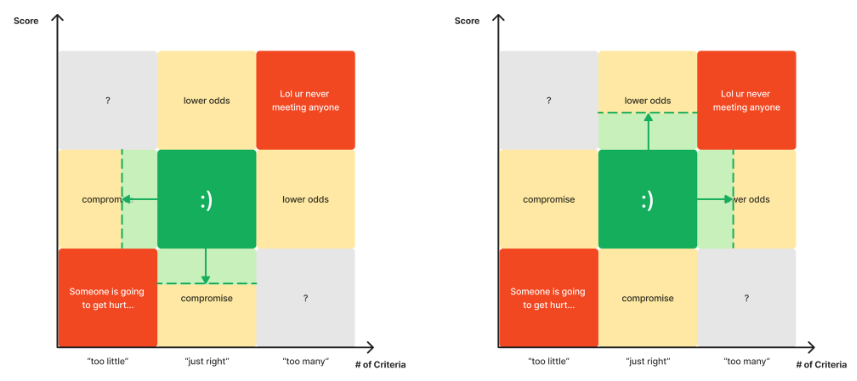
Effectively, this is self-discovery - the more you understand yourself and (more importantly) who you want to become/where you’re headed, the better you understand your needs. Yes, it’s an arduous process, but it’s the only way to really get this right (never mind becoming a better version of yourself). Nowadays, way too many people are not putting in the work to figure this out, resulting in a lot of broken hearts & traumas - truly tragic 😢.
Note on compatibility: it specializes to your partner!
As you deepen a relationship, you unconsciously transform your compatibility function to be specialized to your partner.
Beyond probability, there is actually another major (arguably bigger) reason to whittling down your criteria to 🟩 (the “essentials”): your definition of an “optimal partner” is likely to change beyond those criteria. This is also what gives me huge confidence in my theory, and hope!
Obviously I’m not saying that you wake up one day and find a completely different set of random traits more attractive 😂. But as you deepen a relationship, you start seeing some (though not drastic) degree of change in the things you find attractive (and not in a “compromise”-y way) - unconsciously transforming your compatibility function to be specialized to your partner.
Now, isn’t that beautiful? 😊
TL;DR - just be really rigorous in truly defining your core criteria (i.e. only the stuff you absolutely need to form a deep bond with your partner).
Cool - how to define my 🟩?
As always, devil is in the details. Though I do have notes on this, it’s not quite ready to share (I’m still figuring this out myself 😓) - I may follow up in a subsequent post (or not 🤷🏻♂️).
However, I do have some high-level thoughts. Figuring out the 🟩 requires a combination of gut feel & constant introspection. Everyone has a gut feel, but very few actually do deep introspection - being aware of how you react to the variety of behaviors & traits and really making a conscious effort to deciphering which of those actually matter. And I kinda don’t blame them (it’s a lot of work!), but it honestly is the only way to “sharpen your gut” and reach that happy place faster.

Since the “measuring device” is our gut, it’s quite hard to decipher and have confidence in the signals (at least for me 🥲). It’s even harder if you have deep internal fears/insecurities/whatever-else-ppl-have-going-on that cloud your judgement, which unfortunately is true in many cases in today’s socioeconomic environment.
Here are some high level (non-exhaustive) guidelines that I’ve found useful:
Do you feel you are (or on the path to) connecting with this person at a deeper level?
What are the most memorable/impactful conversations you’ve had?
Do you feel like you can be open & honest with the other person and be yourself?
Do you feel like you are headed to become a better version of yourself as you spend time with them?
Though these don’t necessarily pinpoint specific traits, they are excellent guiding questions that help identify which ones matter (ask the “Why?”s). Heck, if you get strong positive responses from all of these Qs, u might’ve just found the one! 💘
Note on self-awareness: When assessing 🚩s about someone, it’s super easy to simply blame everything on the other person. Though some may be spot on, there are multiple instances where we’re unnecessarily sensitive (often due to over-thinking about stuff that doesn’t really matter), or worse, we were a part of creating (through our own toxic behavior).
Anyways, though it depends on where you are with your self-discovery, this will be an iterative process that requires constant refinement & revisiting.
It takes two to dance 💃🏻
OK I think I know who I’m looking for - we good? Lol u wish.
You’re not the only part of this equation - the other person has to like you too (duh)! And that’s assuming you both know what they’re looking for. Heck sometimes it doesn’t work out for a multitude of other reasons (e.g. unresolved traumas, effort gap, development stage - list goes on).
You.
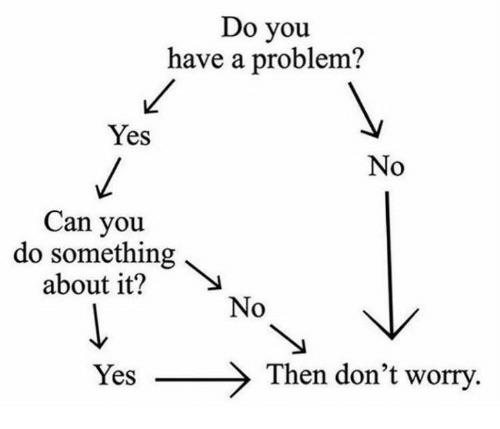
So what to do when you have 0 control over what the other person is attracted to? This is where stoicism comes in handy. The best to do is ask yourself “how do I make myself the best possible partner?” Like it or not, it’s only natural for people to be attracted to people they perceive have a high compatibility (both now, and in the future). Thus, our ability to attract (and retain) a partner is directly correlated with the effort (and obviously, results) we put into ourselves to become the best potential partner. A big part of this is understanding what the partner’s core criteria are (this doesn’t mean change every bit about yourself - more on “change” below). IMO this is the simplest part (never mind relationships - why weren’t you trying to be a better version of yourself?).
“How do I make myself the best possible partner?”
Astonishingly, this mindset seems to be absent in a large fraction of the relationship world today (ppl looking for “what’s in it for themselves”, instead of “what can I give”) - tragic, really 😢.
To change, or not?
In virtually all circumstances (unless you’re one of the lucky few 🍀), you will not meet someone who is “on the dot” on all the criteria of “your ideal type”. This places us in a conundrum - if you don’t have the “100% match”, how do you proceed? This naturally leads us to a very complex (and controversial) question - "can they change to be more compatible with me?”
This, in turn, surfaces a weird duality:
One one hand, it doesn’t sound right to expect someone to fundamentally change all aspects of who they are to fit your “peak compatibility” (and that’s assuming you nailed your 🟩). The thought has definitely crossed all our minds, but it can lead to a pervasive, slippery slope.
On the other hand, the notion of “you’re perfect, there’s not a thing I would not change about you” (romantic as it may be - which I totally get), is misleading & unrealistic. No human is perfect, even the ones who hard very hard to. Arguably, you’re doing them a disservice by not helping them become better people. Dr. Peterson articulates this very well:
OK - so not all change seems to be bad. However, it is crucial to recognize that the amount of change to expect from a person is likely fairly limited (especially if the traits are closer to the person’s core identity). Depending on the magnitude of the gaps (which can widen, as ppl do change), you could end up falling in love with the “idea of someone”, instead of that person. Deep inside, we all inevitably fall in love with the “idea of someone” - it’s simply a matter of how big the gap between that “idea” and the person is.
So how the heck does one navigate this..? As any complex question, it depends!
Alignment.
IMO, it all comes down to whether the person actually agrees with the direction of the desired change (otherwise it’s just manipulation).
…one of the biggest benefits to a relationship is that both partners become better versions of themselves.
There are 2 key prerequisites for pulling this off:
Vision (x2)
Each person needs to develop their vision about who they want to be in the future - that’ll help narrow down which are traits they like about themselves, and gain the confidence to stand their ground and not end up self-deprecating.
Conversely, there also will be traits that are not part of, or get in the way, of “future you”. These are the ones that probably should go through change.
Trust
Seems kinda obvious (though very hard, especially in the current state of the dating world), but each partner should be looking out for the other’s best interests.
Since “figuring ourselves out” is a lifelong process, developing your life’s vision goes from a solo-exercise to a co-creation process (you still remain in the driver’s seat, but you have someone to help you navigate). As relationships solidify this foundation, it becomes more feasible (and important, especially if you perceive it as a threat to your long-term compatibility) to have some of these difficult conversations. Also note that changes are hard (the closer to the person’s core, the harder it is), take time, and probably have some limit for the extent of change - having realistic expectations is key. The challenge at the dating stage is that this foundation has not yet been established, so it becomes much harder to have these convos, and we must take a “leap” based on whatever conviction we have at that point.
I am a firm believer that one of the biggest benefits to a relationship is that both partners become better versions of themselves. Though doing this successfully requires a lot of mental energy, empathy, and effort, it will lead to a much better version of you and your relationship.
When chatting with ppl in healthy, long-term relationships, you’ll frequently hear:
“Relationships are hard work”
“Relationships = knowing how to compromise”
I’ve wondered what this actually meant for quite a while, and after laying it out like this, I think I am starting to get it. My current interpretation is that the tough part of long-term relationships is the difficulty of working with your partner to improve the couple’s overall compatibility, without overriding traits each deem essential.
Fun Tangent: Did dating apps ruin everything?
Hmm tough to say, but my hypothesis is no - it simply has done what every new technology does: bring upsides & downsides.
Pro: Expanded Reach
Potential of meeting a better match we otherwise wouldn’t have had.
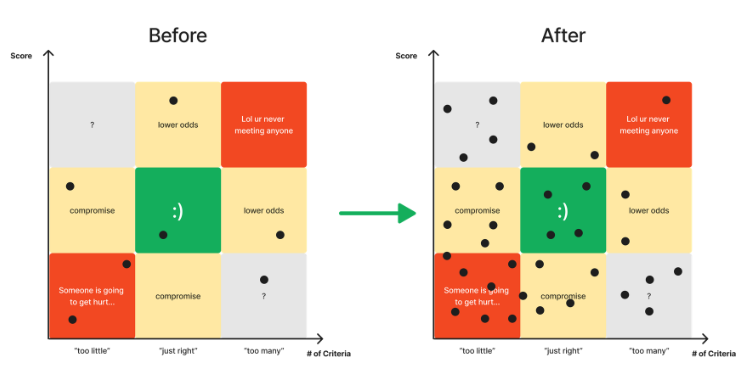
Con: Illusion of “unlimited options”
Conducive to (a) low commitment/insincere behavior, and (b) not work on themselves (since there’s “another one around the corner”).
Makes decision-making hard (compatibility is a spectrum, not a binary variable), the likely cause of “situationships”
If you think about it tho, the problem itself hasn’t really changed - the limitation is simply humans’ inability to properly handle the increased volume (as evidenced by the “hate on dating apps”). Nevertheless, there are clear signs that the current tools are not doing a good job:

Side note: This does sound like a good place for an AI startup… 🤔
It’ll all be worth it! 🥹
So, yeah… finding & building love is tough!
Did I enjoy going through this exercise? Yes and no.
Yes, I finally got the clarity I direly needed (finally can breathe a little 😮💨). Though it was incredibly uncomfortable in many parts (as this had elements of objectifying people into a set of “numbers”), I now have full conviction that this is the right way to approach love (nevermind dating).
No, in that has opened my eyes to some sad truths:
We are basically trying to make a binary (Yes/No) decision for what in reality is a spectrum (of compatibility). Parting ways with people you do care about hurts (when there is a probability, small as it can be, that you could’ve made things work).
One can be a glaring “green light” in many ways (positive mindset, genuine, etc.) but the other may still not be attracted to them.
Despite all of this, we must remain strong & maintain hope. Like many things in life, I believe those who put in the work (introspection & self-improvement) and persevere will be rewarded. So stay resilient, work on yourself, focus on being the best partner, and go into every opportunity with a positive, fully-engaged mindset - this honestly applies to everyone, regardless of the stage of the relationship.
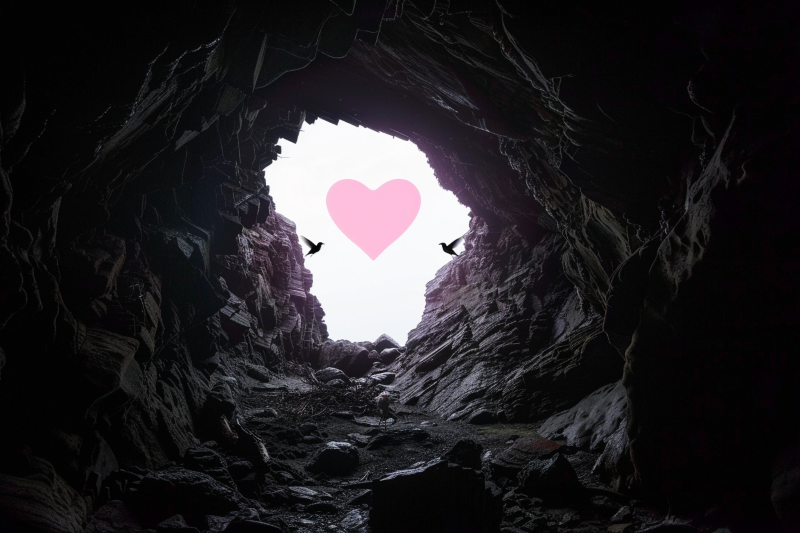
Anyways, in the spirit of Valentine’s Day (100% coincidence I finished this post today 🤣), may the 💖 be with you.
P.S. This is a working theory and I’m open to criticisms & other viewpoints (as long as they make sense), so hmu if you got anything!